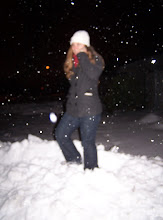However, the act of performance and its obvious connection to writing and literacy have been little used in college composition courses. At least in my experience they haven't been taken advantage of. More and more, instructors are seeing the importance of multi-media writing, but even that is given less priority. Composition courses are meant to help students write essays so that they can "perform" in the "real world," right? Yeah, that doesn't make much sense to me either.
These are the types of issues that Fishman, Lunsford, McGregor, and Otuteye discuss in their article, "Performing Writing, Performing Literacy." The authors argue that
Performance is a dynamic form of literate expression that is both fun and deeply serious. Immediate and face-to-face, performance encourages active participation and collaboration, and thus it models many of the qualities we value most in real-time new-media writing, while at the same time it brings renewed attention to talk and scripted forms of oral communication. A tool for innovation as well as a potential vehicle for helping students to transfer literacy skills from situation to situation, performance, at least from our perspective, stands to reinvigorate both teaching and learning in the writing classroom. (226-7)
What an enlightening concept! On one of the most obvious and basic levels, in composition classes, we stress the importance of audience to students, but we rarely utilize the helpful analogy and strategy of audience in terms of performance: concerts, plays, movies, etc. Our students can relate to all of these types of performances, but we should show them the connection between these and their writing.
I saw the impact of performance in my own ENG 102 class just recently, though I did not realize fully at the time that I was using a theoretical strategy. As my students and I discussed the introduction to Graff's and Birkenstein's They Say, I Say: The Moves That Matter in Academic Writing, the students struggled with the concept. We tried applying and recognizing the "They, Say, I Say" moves in an actual academic article, but because the students couldn't get past their own initial reactions to the article and the fact that the author never explicity used the words "I say," we were really getting nowhere. One point in particular seemed to resonate with them from the text though. Graff and Birkenstein point out that in "the real world we don't make arguments without being provoked" (3). I initiated a conversation about "real world" arguments. Students began to comment that when in an argument with a friend, they use the other person's words againste them. Essentially, "you said (fill in the blank,) but that's not true...." So, I decided to use the concept of a "real" argument in the classroom. I split the students into two teams. Because some of them thought the author's argument was effective while others thought it was faulty, I gave one team the "effective" argument and the other team the "faulty" argument. I gave them ten minutes to collaborate with their team members and to research the text for moments that supported their argument. I gave them the instructions that they were required to use evidence from the text. They then debated their positions. Before I knew it, not only were the students engaging the text, but they were also engaging with one anothers statements and arguments, using one another's words. They were performing "They Say, I Say."
While I attempted to make the connection between this debate and their writing, I believe if I had read this article before the class, I probably could have done so more confidently. What the students took away from the exercise has changed the dynamic in the classroom though. They are discussing the material with me AND their peers, using evidence from the text at hand. I can't wait to try more exercises like this in the future, and hopefully, I am now better prepared to make those explicit connections between performance and writing.

No comments:
Post a Comment